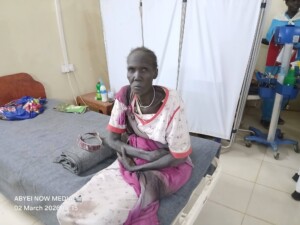Human rights organs ask: Will Darfur victims finally see justice?
The International Federation for Human Rights (FIDH), the African Centre for Justice and Peace Studies (ACJPS), and the Sudan Human Rights Monitor (SHRM) have welcomed this week’s announcement by the Sudanese government that all those subject to arrest warrants by the International Criminal Court (ICC) for allegedly committing war crimes, crimes against humanity and genocide in the Darfur conflict, including former president Omar Al Bashir, will be surrendered to the ICC.
 Deposed Sudanese dictator Omar Al Bashir (File photo)
Deposed Sudanese dictator Omar Al Bashir (File photo)
The International Federation for Human Rights (FIDH), the African Centre for Justice and Peace Studies (ACJPS), and the Sudan Human Rights Monitor (SHRM) have welcomed this week’s announcement by the Sudanese government that all those subject to arrest warrants by the International Criminal Court (ICC) for allegedly committing war crimes, crimes against humanity and genocide in the Darfur conflict, including former president Omar Al Bashir, will be surrendered to the ICC.
A joint statement via the ACJPS website today suggests that if carried out, this would be the first measure of justice since the outbreak of the conflict in Darfur in 2002, where victims have not seen anyone held to account, and have yet to receive reparation. As the reports of the surrender are to be confirmed by the ICC, it is crucial that Sudan’s sovereign council promptly follow its announcement with concrete operational and legal arrangements necessary for the surrender of all suspects to the Court in The Hague.
“Despite feeling abandoned by the international community, victims in Darfur never stopped fighting to see the day justice triumphs over impunity. The fight continues, but this is a first step towards recognising that victims have a right to justice and reparation for the horrific crimes committed,” said Mossaad Mohamed Ali, ACJPS Executive Director.
The sovereign council’s announcement now needs to be followed by action, including through full cooperation with the ICC and granting the Court access to the country and to information necessary for its investigation and prosecution. The sovereign council and concerned Sudanese authorities must also work towards complementing justice at the ICC with effective reforms at national level to address the myriad human rights violations and international crimes that will not be considered by the ICC.
“The people of Sudan have waited far too long to live in a country where the norms of human rights, democracy and accountability prevail,” said Magdi El Na’im, SHRM Secretary General. “Addressing the crimes of the past through a transitional justice process is a key ingredient in moving forward towards rebuilding the country on the basis of the rule of law.
For the ICC, the surrender of all fugitives from Sudan would bring to fruition its nearly fifteen-year efforts to secure their arrest. Several States Parties defied the ICC’s arrest warrants, welcoming Omar al-Bashir to their territories. The lack of progress in the Darfur situation also called into question the effectiveness of the United Nations Security Council in following up on and supporting referrals to the ICC, with the ICC Prosecutor effectively “hibernating” the investigations into Darfur in 2014, decrying the Security Council’s inaction.
“States Parties to the ICC now need to support the Court in following up on a promise made to victims a very long time ago. States need to make resources available to allow the Court to carry out robust investigations and prosecutions, and to engage with the affected communities,” said Alice Mogwe, FIDH President. “The Court needs to get this right: it must re-engage with victims and affected communities and publicise its work effectively so that justice is visible to the people affected by the crimes,” Mogwe concludes.
Radio Dabanga’s editorial independence means that we can continue to provide factual updates about political developments to Sudanese and international actors, educate people about how to avoid outbreaks of infectious diseases, and provide a window to the world for those in all corners of Sudan. Support Radio Dabanga for as little as €2.50, the equivalent of a cup of coffee.












 and then
and then